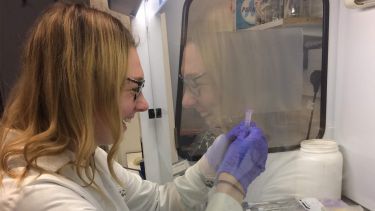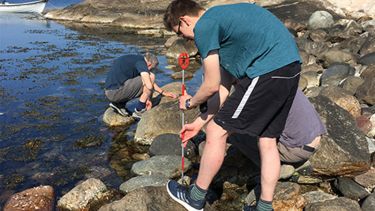Explore this course:
Applications for 2024 entry are now open. Apply now or register your interest to hear about postgraduate study and events at the University of Sheffield.
Biosciences
School of Biosciences,
Faculty of Science

Course description
Our Biosciences MRes at Sheffield is aimed at those with a strong motivation to pursue a career in research. The course provides you with opportunities to pursue in-depth research and further develop your scientific skills within a world leading, research-focused School of Biosciences. You’ll be embedded within a lab with academics from one of our Research Clusters:
- Ecology and Evolutionary Biology
- Development, Regeneration and Neurophysiology
- Molecular Biology: Biochemistry to Disease
- Molecular and Cellular Biology
- Plants, Photosynthesis and Soils.
Our research spans the full breadth of biology from cells and genes, to human biology to biodiversity and climate change.
Our world-class research will underpin your training whether you are interested in biotechnology, plant biology, photosynthesis, sustainable agriculture, stem cell biology, disease (cancer, ageing, covid), antibiotic and antimicrobial resistance, cell, human, molecular, population and evolutionary genetics, microbiology, conservation biology, biodiversity, or sustainability.
You can investigate research opportunities by looking at our research foci and teams in our five different research clusters. Please note that not all supervisors/research labs are available each year; also note that emeritus professors/staff are not available to supervise projects. You may contact the school for further details.
Your research experience
This research-focused course allows you to spend a full academic year embedded in one of our research groups, working alongside our staff, PhD students, and post-doctoral researchers who are at the forefront of their research field. Throughout your course, you’ll develop your research skills, giving you the opportunity to contribute new knowledge in your chosen area.
In addition to the research, you’ll receive bespoke training in data analysis and visualisation and in science communication. Previous students have conducted lab or fieldwork in our outstanding labs in Sheffield, with UK industrial partners and even abroad.
Modules
Core modules:
- Research Project
-
This module allows students to develop skills relevant to a career in biological research. It will consist of a laboratory, field-based or computational research project where each student will work under the supervision of a member of academic staff. The student will formulate the hypotheses and questions to be addressed and plan and carry out experiments to test these hypotheses. The project will be written up in the form of a scientific paper and the student will keep a notebook of the research.
120 credits - Literature Review
-
The literature review requires the student to write a critical review of a biological topic of choice. The literature review will involve extensive reading of original research papers, reviews and books together with information extracted from other media. The student will be required to critically analyse hypotheses in the field and critically analyse the quality of the evidence used to support them. Where controversies exist the student should be prepared to indicate which side has the stronger case. The literature review should also identify gaps in our current knowledge and understanding and make suggestions for the future developments in the field.
15 credits - Scientific Skills and Project Management
-
The aim of this module is to provide students with advanced training in the use of statistical methods and computers to visualise and analyse biological data which is necessary to pursue a research career in whole organism biology. Advanced principles of programming for data analysis, data interpretation and statistical analysis, and graphical presentation are stressed. The course is based on the statistical programming language R and the Integrated Development Environment RStudio. The course is comprised of eight introductory sessions delivered in Semester 1, and then a choice of two out of six specialist modules selected to support student-specific requirements in research. Semester 1 content is delivered as a mix of online recorded videos (watch this), a set of readings (read this) and a practical exercise (do this). This is supported by a weekly live mini-review lecture and Q andamp; A, and a help session. Semester 2 content is delivered live via three to four 3-hour practical computing sessions (1 specialist module/week, 3-4 sessions per week).
30 credits - Science Communication for Researchers
-
This module provides training in the skills and approaches necessary to effectively communicate science. The module has three main components:
15 credits
1. An intensive science communication workshop focusing on interactions with the print and broadcast media;
2. A poster presentation, where students design and produce a poster to communicate their research project to a target audience (e.g. general public,
research audience);
3. A formal oral presentation, where students present their research results to their peers.
The content of our courses is reviewed annually to make sure it's up-to-date and relevant. Individual modules are occasionally updated or withdrawn. This is in response to discoveries through our world-leading research; funding changes; professional accreditation requirements; student or employer feedback; outcomes of reviews; and variations in staff or student numbers. In the event of any change we'll consult and inform students in good time and take reasonable steps to minimise disruption.
Open days
An open day gives you the best opportunity to hear first-hand from our current students and staff about our courses.
Find out what makes us special at our next online open day on Wednesday 17 April 2024.
You may also be able to pre-book a department visit as part of a campus tour.Open days and campus tours
Duration
1 academic year full-time
Teaching
You’ll learn through a mixture of working in a research laboratory or on a field-based research project, tutorials, discussion groups, seminars, and statistics and other workshops.
Your extended research project will span both semesters of the academic year where you’ll be working alongside academic experts and professional scientists This will give you first-hand experience of designing your own experiments, analysing results and culminating in you presenting your findings to colleagues.
Assessment
Most assessment is through coursework. Your assessment includes, but is not limited to, a project report, literature review, poster presentations, oral presentations, written grant proposals and online statistics exams.
Your career
The immersive nature of your MRes course will equip you with the breadth of research experience and range of specialist skills to prepare you for a career as a leader in bioscience.
Our students go on to work in top 100 organisations around the world, government organisations and a variety of charities and NGOs. Many continue their postgraduate studies with a PhD. Whatever your career plans are, you will be supported by our Skills and Employability team to prepare you for the next stage of your career.
Department
School of Biosciences
The School of Biosciences brings together more than 100 years of teaching and research expertise across the breadth of biology.
It’s home to over 120 lecturers who are actively involved in research at the cutting edge of their field, sharing their knowledge with more than 1,500 undergraduate and 300 postgraduate students.
We carry out world-leading research to address the most important global challenges such as food security, disease, health and medicine, ageing, energy, and the biodiversity and climate crises.
Our expertise spans the breadth and depth of bioscience, including molecular and cell biology, genetics, development, human physiology and pharmacology through to evolution, ecology, biodiversity conservation and sustainability. This makes us one of the broadest and largest groupings of the discipline and allows us to train the next generation of biologists in the latest research techniques and discoveries.
Entry requirements
Minimum 2:1 BSc honours degree in biology or a closely related quantitative subject.
In addition, you should be able to demonstrate evidence of aptitude and enthusiasm for research, for example, through an undergraduate research project.
Overall IELTS score of 6.5 with a minimum of 6.0 in each component, or equivalent.
How to apply
Because of the research-intensive nature of this course, we ask you to include a short supporting statement of 500-700 words along with your formal application. This additional supporting statement should:
- Explain how your interests and experience relate to the breadth of research we do in the School of Biosciences.
- Explain why you want to do a research-intensive masters degree and how this fits with your career plans.
- Include which of the five research clusters you would be most interested in working in and why. If you have already been in contact with a prospective supervisor, please let us know. Note (as detailed above) that not all supervisors will be available to host projects and that Emeritus staff do not host projects.
Please submit your application by 15 August if you require a student visa and by 31 August if you do not require a visa.
If you have any questions about entry requirements, please contact the department.
Fees and funding
Apply
You can apply now using our Postgraduate Online Application Form. It's a quick and easy process.
Because of the research-intensive nature of this course, we ask you to include a short supporting statement with your application. Please see the course description above for more details.
Contact
biosciences-pgt@sheffield.ac.uk
+44 114 222 2341
Any supervisors and research areas listed are indicative and may change before the start of the course.
Recognition of professional qualifications: from 1 January 2021, in order to have any UK professional qualifications recognised for work in an EU country across a number of regulated and other professions you need to apply to the host country for recognition. Read information from the UK government and the EU Regulated Professions Database.

.jpg?itok=Td9mjyqC)
